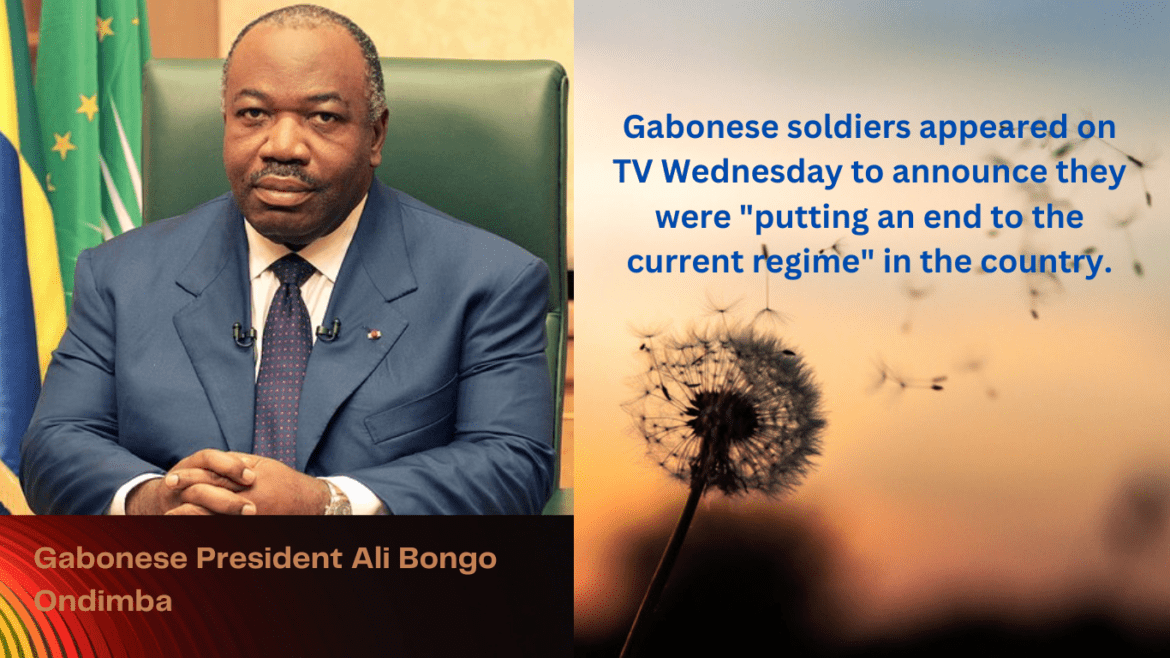A group of senior Gabonese military officers were present on national television Wednesday morning and stated that they have taken power, a few minutes after the announcement of the national electoral institution declaring President Ali Bongo the winner of a third term.
Officers present on Gabon 24 television channel said they represent all security and defense forces of the Central African nation. They claimed that the election results have been invalidated, borders are closed, and all national institutions are dissolved until further notice.
A Reuters correspondent reported that shortly after the joint statement was read, the sound of heavy gunfire could be heard in the capital, Libreville.
No immediate comment was available from the government’s side. He was last seen in public as he voted on Saturday.
“In the name of the Gabonese people… we have decided to put an end to the suffering, to re-establish peace, to preserve the stability of our country,” the officers said in a statement.
As the officer read the joint statement, nearly a dozen others stood behind him, wearing military fatigue and holding weapons.
The civilian population identified themselves as members of the Committee for the Transition and the Restoration of Institutions. They declared the government, the Senate, the National Council, the Constitutional Court, and the electoral institutions dissolved.
If successful, the uprising will bring representation to West and Central Africa since 2020. The recent years have witnessed a decline in democratic progress in Mali, Guinea, Burkina Faso, Chad, and Niger.
Last month, the military took control in Niger, sent Sahel troops to wipe out Shoqweveb, and actively squeezed international interests in cunning maneuvering.
Amid concerns of instability following Saturday’s presidential, parliamentary, and senatorial elections, the streets of Gabon were filled with excitement on Saturday as President [Ali] Bongo sought to extend his family’s 56-year grip on power, his opponents having exerted pressure for change, citing oil and cocoa-rich, but poverty-stricken, populations.
The absence of international observers, the suspension of some foreign broadcasts, and doubts over the cleanliness of the electoral process had led to tensions. Subsequently, internet services were cut and a nationwide curfew was imposed by the authorities.
Troops briefly seized national radio stations and broadcast a message calling on citizens to rise up. Gabon failed in an attempted military coup in January 2019, after soldiers briefly took over state radio and issued a statement calling for an uprising.
After a few hours of intense clashes between supporters of rival planners, two were killed and several others were arrested for suspicion of incitement to violence. The situation was restored after several hours, following the arrests.
Prior to the Gabnij Election Center, it was announced on Wednesday that Bongo had won the election with 64.27% of the votes, while his main rival Albert Ondo Ossa secured the second position with 30.77% of the votes.
A 64-year-old Bongo, who had assumed his father Omar’s place in 2009, faced opposition from 18 challengers, including Ondo Ossa, who had the support of six opposition parties in an attempt to suppress his candidacy.
The government stated that web blackout and curfews were necessary to prevent the spread of false information and to ensure public safety. Bongo’s victory in the contentious 2016 election had sparked violent protests, resulting in a fire at the parliament building.
His camp and the opposition alliance led by Ondo Ossa disputed allegations of electoral fraud, citing delays in opening numerous polling stations due to technical issues related to the voting process.
Aside from the Alternyance 2023 coalition, other complaints emerged that ballots for its candidates were not properly distributed in some areas. Reuters couldn’t independently verify the claims.
The European Union wasn’t invited to observe this election monitoring. EU observers had previously raised questions about the legitimacy of Bongo’s narrow victory in the 2016 presidential vote.
On Monday, Media Watchdog Reporters Without Borders (RSF) expressed concern over internet blocking and the temporary suspension of broadcasting by French international news outlets RFI, France 24, and TV5 Monde, by RSF correspondent Widaout Borders.
“RSF condemns the series of attacks on the freedom and information provided by the press, such information can harm the transparency of the general elections,” it stated in an online post.
Opponents, citing allegations of fraud, questioned both of Bongo’s previous wins. His father Omar took power in 2009 following his death, before his re-election in 2016.


